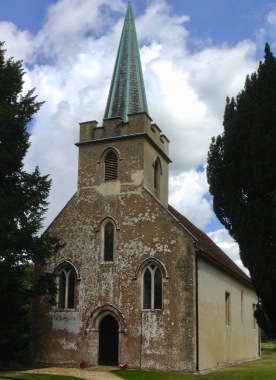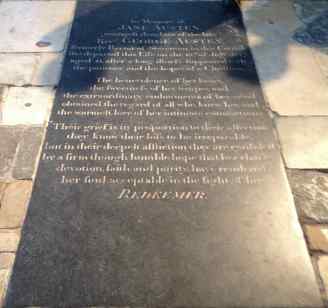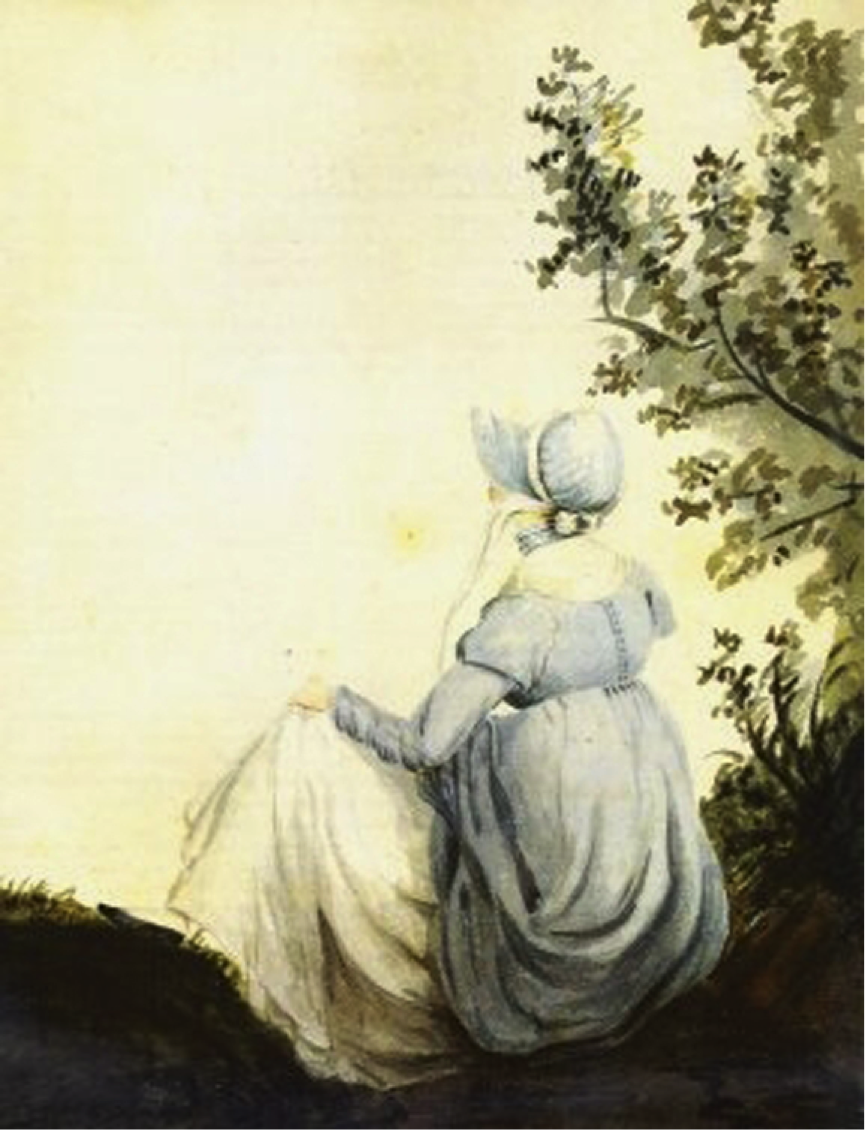By Brenda S. Cox
“I cannot suppose we differ in our ideas of the Christian religion. You have given an excellent description of it. We only affix a different meaning to the word evangelical.”—Jane Austen in a letter to her niece Fanny Knight, Nov. 30, 1814.
Was Jane Austen a Christian? I am often asked this question. The difficulty with the question is that we may “affix different meanings” to the word Christian. Unfortunately, as far as I’ve been able to find out, we don’t have Fanny’s letter where she described what she meant by Christian.
Usually when a Christian asks if someone else is a Christian, they mean, “Are they a Christian like me, the way I define it?” Jane Austen certainly would have defined herself as a Christian, so let’s consider what that might have meant to her.
I’ll briefly summarize some of the evidence, and give you resources for further reading.
What “kind” of Christian was Jane Austen?
She was a believing, practicing Anglican; Church of England. Her father was an Anglican rector (a type of minister), and two of her brothers became Anglican clergymen. She was privately baptized by her father at home Dec. 17, 1775, the day after her birth, with the public ceremony in church on April 5, 1776.
Presumably, she was confirmed when she was older, following the normal practice of the church. She learned the catechism, including the Apostle’s Creed, the Lord’s Prayer, the Ten Commandments, and various questions and answers about the Christian faith. When she could recite all that, she and other young people were confirmed by a bishop.
In baptism, her godparents promised to help her: renounce the devil, the world, and the flesh; believe all the articles of the Christian faith; and keep God’s will and commandments. This made her “a member of Christ, the child of God, and an inheritor of the kingdom of heaven.” At confirmation, she took those promises as her own.

What religious practices did Jane Austen follow?
- She appears to have been in the regular habit of going to church Sunday mornings and afternoons. Even when she was not at home, her letters mention going to church or chapel on Sundays. There is some evidence that her family often read daily prayers together, mornings and evenings, as well.
- In 1794, probably as a preparation for her confirmation in the church, Austen received a copy of William Vickers’ Companion to the Altar. This book strongly emphasizes self-examination before taking Communion (the Lord’s Supper, or the Sacrament). Austen apparently read the prayers and meditations in it often. In her letters she also mentions taking the Sacrament, as a serious commitment.
What religious books did she read?
- Jane Austen read books of sermons, which were popular in her time. Her novels and letters mention books of sermons by Fordyce, Blair, her cousin Edward Cooper, Gisborne, and Sherlock. Sherlock was an Anglican bishop. Jane told her niece Anna that she preferred his sermons to almost any others. He wrote very rational sermons, defending the Christian faith. One of his most famous sermons put Christianity on trial, and, going through a legal process of presenting evidence, declared it true.
- One of Austen’s favorite writers was the poet William Cowper, who she mentioned and quoted in some of her novels. Cowper was an Evangelical Christian who often wrote on religious themes. Her other favorite authors, according to the Memoir written by her nephew, were Samuel Johnson and George Crabbe. They also sometimes wrote about religious topics.
How personal was her faith?
She wrote three beautiful prayers, apparently designed for family worship times. Their style is based on the Book of Common Prayer. They address issues that we know she struggled with in her personal life, and that are mentioned in her novels, such as the need for personal self-examination and not judging other people. She prays that we not “be Christians only in name.”
She also made a revealing comment about art. She loved Benjamin West’s painting Christ Rejected. She wrote to Martha Lloyd on Sept. 2, 1814, that the painting “has gratified me much more, & indeed is the first representation of our Saviour which ever at all contented me.” This implies to me that she had a personal image of Christ in her mind and heart, and was looking for it in art.
Austen was also involved in good works, sewing for and visiting the poor.

Do her novels reflect her faith?
Austen apparently did not consider novels an appropriate place to openly discuss faith, as some heavy-handed writers did in her time. However, she does use words with religious connotations, though we may not recognize them today as “faith words.” Many of her characters experience repentance and a change in their lives. They attend church. Immoral people (like Willoughby and Wickham) are punished to some extent, and morality is rewarded. In Mansfield Park, characters discuss religious issues of the day. We see that Henry and Mary Crawford have a shallow idea of religion being for show, while Edmund Bertram and Fanny Price share a deep, true faith.
Was Jane Austen an evangelical?
Apparently Austen was not an evangelical, though references in her letters show that she felt positively about them later in her life. She wrote to her niece Fanny Knight, “I am by no means convinced that we ought not all to be Evangelicals, & am at least persuaded that they who are so from Reason & Feeling, must be happiest & safest” (Nov. 18, 1814).
She did not like her cousin Edward Cooper’s emphasis on “Regeneration & Conversion” in his Evangelical sermons, however. Orthodox Anglicans believed that people were regenerated when they were baptized as infants, and that they gradually grew in their faith throughout their lives, rather than having a one-time conversion experiences as Evangelicals generally believe.

What did her family think of her faith?
Her nephew in his Memoir calls her a “humble, believing Christian.” The epitaph on her grave says that her family was “consoled by a firm though humble hope that her charity, devotion, faith and purity have rendered her soul acceptable in the sight of her REDEEMER.”
We can never truly judge the state of someone else’s personal relationship with God. However, Jane Austen considered herself a Christian. And, from reading her writings, her prayers, and her biographies, I believe that she was a person who loved God and trusted Jesus for her salvation. And that, to me, means she was a Christian.
How do you define being a Christian? And do you think Austen was one, according to your definition?
For Further Exploration
Much has been written about Austen’s faith. I encourage you to explore further, using some of the following resources:
Jane Austen’s Religious Upbringing and her Anglican Church
- Jane Austen: The Parson’s Daughter by Irene Collins
- The Spirituality of Jane Austen by Paula Hollingsworth; this is one of the best biographies of Jane Austen I’ve read.
- Jane Austen’s Anglicanism by Laura Mooneyham White
- The Book of Common Prayer includes the liturgy, ceremonies, prayers, and readings of the Anglican Church, which Austen would have heard and said many times in her lifetime.
- A Memoir of Jane Austen, by James Edward Austen-Leigh, is quoted above.
- Some general biographies of Austen explore her religious background, including, for example, Jane Austen at Home by Lucy Worsley.
Jane Austen’s Prayers
- Praying with Jane: 31 Days Through the Prayers of Jane Austen by Rachel Dodge
- Prayer and Praise: A Jane Austen Devotional by Shannon Winslow
- “ ‘A Nation Improving in Religion’: Jane Austen’s Prayers and Their Place in Her Life and Art” by Bruce Stovel in Persuasions
Christian aspects of Austen’s Novels
- Miniatures and Morals by Peter Leithart explores the Christian themes of each of Austen’s novels, including questions to consider and discuss.
- Jane Austen and Religion by William Jarvis; this little book is also very readable and enjoyable.
- Some Words of Jane Austen by Stuart M. Tave includes many words Jane Austen uses that had a religious meaning in her time period, though we may not recognize that today. See my series on Faith Words.
- Jane Austen and the Clergy by Irene Collins describes the church in Austen’s day and how it is portrayed in Austen’s novels. She shares many very helpful insights.
- “Marianne Dashwood’s Repentance, Willoughby’s ‘Repentance,” and the Book of Common Prayer,” by Brenda S. Cox, in Persuasions On-Line Winter 2018.
- “Churches, Chapels, Abbeys, and Cathedrals in Northanger Abbey,” by Brenda S. Cox, in Persuasions On-Line Winter 2019.
- “Preparation for Death and Second Chances in Austen’s Novels,” by Brenda S. Cox, in Persuasions On-Line Winter 2020.
- “Satirical Cartoons and Jane Austen’s Church of England,” by Brenda S. Cox, in Persuasions On-Line Winter 2021.
- Jane Austen and the Reformation, by Roger E. Moore, has especially helpful sections about Northanger Abbey and Mansfield Park.
- Jane Austen: Real and Imagined Worlds by Oliver MacDonagh has a chapter on religion based on Mansfield Park. Jane Austen in Context, edited by Janet Todd, also has a helpful chapter on religion, by Michael Wheeler.
- The Religious Dimension of Jane Austen’s Novels by Gene Koppel and Jane Austen and Religion: Salvation and Society in Georgian England by Michael Giffin are more academic titles exploring religion in Austen’s work.



Lovely article.thanks for the insight.
LikeLike
You’re very welcome!
LikeLiked by 1 person
Thank you for your astute, succinct, and nuanced thoughts on Jane Austen and her Christian faith. I have been a Jane Austen fan since seeing the movie of Sense and Sensibility 20 years ago. My interest continues to grow. I read all your commentary with great interest and delight. I, myself, am an evangelical Christian, although the way “evangelical” is often understood and described makes me cringe. My life as a seminary professor and ordained minister explains part of my interest in Jane Austen. Thank you for contributing to my education.
LikeLike
Thanks very much for your encouragement, Michael! I hope you will follow this blog and/or my Facebook page (facebook.com/BrendaSCoxRegency) if you want to see more. I expect you would enjoy my book, which is nearly finished, but I am still looking for a publisher; I’d appreciate your prayers for that. Many blessings to you.
LikeLike
Thank you again Brenda for your work. I will be looking into more of your thoughtful writing. In your search for a publisher, have you looked into Wipf and Stock Publishers out of Eugene, Oregon? They have a couple publishing brands that might work for you. They have a unique approach to publishing. I hope that your quest to publish your work is answered soon. For now, I suspect that our Lord is using your writing more than you might imagine. Godspeed.
LikeLike
Thanks very much, Michael; I’ll check that out!
LikeLike
Just finding this blog, and the perspective on Jane Austen’s faith is much appreciated. It’s true that she doesn’t express her faith directly in her novels, though of course you can feel directly her sense of morality, of right and wrong.
And then there are those arguments specifically about religion, between Edmund Bertram and Mary Crawford, in Mansfield Park. Those are some of the most interesting passages of MP for me.
Thanks again for this perspective on Jane Austen!
LikeLike
You’re welcome, Kevin! I’m writing a book on this and looking for publishers right now. I much appreciate your encouraging words.
LikeLike
No problem, Brenda, and I hope you find a publisher; it’s a nice topic and maybe not one that is covered too often, though you would know if that’s case; it’s just my own impression as a new Austen reader that religious themes in her life and novels are not as much written about as secular themes.
I’ve linked your blog to my own (which I’ve only just started); our topics are somewhat similar and I look forward to seeing more of your posts, as well as any notice of a published book!
LikeLike
Thanks, Kevin. Feel free to share a link to your blog in the comments here.
LikeLike
Appreciated, Brenda. Very much a work in progress:
https://textflight.blog/
Do you happen to know what Bible Jane Austen read? Perhaps still KJV?
LikeLike
Yes, she read KJV. The Book of Common Prayer, which she followed in Anglican daily services, uses the KJV except for the Psalms. The yearly readings cover most of the Bible, plus all the Psalms each month. The Psalms they used are from the older Coverdale version. For more on the BCP, see brendascox.wordpress.com/2019/01/03/reading-prayers-the-book-of-common-prayer/
Your blog looks very interesting, thanks!
LikeLike
I Was looking for some takes regarding this topic for a religious books and I found your article quite informative. It has given me a fresh perspective on the topic tackled. Thanks!
LikeLike
You’re very welcome, Leif. I’m glad it was helpful!
LikeLike